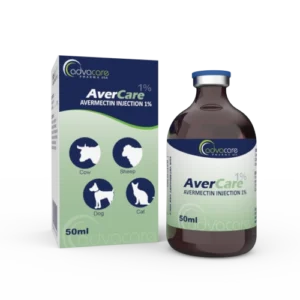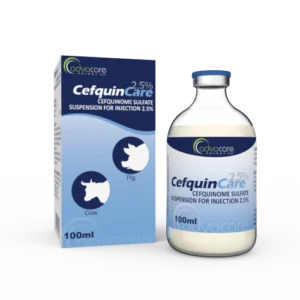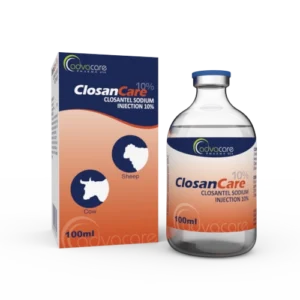What is Doxycycline Hyclate?
- Antibiotic
- Dog,
- Cow,
- Goat,
- Sheep,
- Pig
Active Ingredients: Doxycycline Hyclate
Doxycycline Hyclate Injection is an antibiotic drug used to treat many types of infections in animals such as dogs, cows, goats, sheep, and pigs. It is indicated in the treatment of many illnesses, including toxoplasmosis, leptospirosis, Rocky Mountain spotted fever, psittacosis, Mycoplasma, and Lyme disease.
Doxycycline hyclate is sometimes prescribed for upper respiratory infections and methicillin-resistant Staph intermedius (MRSI). It is also used in combination with other medications to treat heartworm infections. As a broad-spectrum antibiotic, it is suitable for targeting a wide range of bacterial pathogens. Its ability to penetrate bacterial cells effectively allows it to act on intracellular parasites and bacteria.
Doxycycline belongs to the family of medicines called tetracycline antibiotics. It works by inhibiting the first stage of protein synthesis in the bacterial cell wall. Doxycycline is effective against many gram-positive and gram-negative bacteria. It demonstrates anti-inflammatory properties that can be beneficial in managing of certain chronic diseases or conditions. For example, its use in treating health issues like osteoarthritis has been explored due to its potential to reduce joint inflammation.
Doxycycline acts by binding to the 30S ribosomal subunit in the microbial cell, preventing the binding of aminoacyl-tRNA to the mRNA-ribosome complex. This interaction effectively stops the addition of amino acids to the growing peptide chain and inhibits bacterial protein synthesis. Because mammalian cells do not have this type of ribosomal subunit, doxycycline is selectively toxic to bacteria without major effects on the host animal.
Its lipophilic nature allows the drug to concentrate in certain tissues, leading to sustained antibacterial activity. This tissue penetration is beneficial in treating infections localized in specific organs or system. Its extended half-life and good tissue distribution also make it a suitable option for once-daily dosing in many animals, reducing the chances of missed doses and improving adherence to treatment.
It is important to note Doxycycline Hyclate Injection is for veterinary purposes only. It should not be administered to humans or used outside its prescribed indications. Always ensure that any medication, including Doxycycline Hyclate Injection, is used under the guidance and prescription of a qualified veterinarian.
Basil Hygiecare is the producer and exporter of Doxycycline Hyclate Injection. Our reliable, cost-effective livestock medications are manufactured under GMP guidelines across facilities in the US, China, and India. We routinely inspect these facilities to ensure our products meet health, safety, and environmental standards.
Why are we a trusted Doxycycline Hyclate manufacturer?
Doxycycline Hyclate Injection is manufactured and globally distributed by Basil Hygiecare, a leading manufacturer of veterinary injections in the pharmaceutical industry. We have been committed to distributing high-quality, GMP-certified veterinary medications for the global market over the past 20 years. As a top Doxycycline Hyclate manufacturer, we ensure that all of our 100+ veterinary injections surpass our distributors’ requirements by conducting routine internal and third-party facility audits.
Precautions
Do NOT use Doxycycline Injection for an animal that:
- has a known allergy or hypersensitivity to any of the ingredients.
- is currently taking antacids, iron, or calcium supplements that can reduce its absorption.
- has a history of kidney disease.
Treatment with this drug should be administered with caution if an animal:
- is pregnant or lactating.
- has liver disease.
- is young or a newborn.
- has a history of sun sensitivity.
- is in the last half of pregnancy.
Inform the veterinarian about the animal’s previous medical history.
There are known interactions between doxycycline and many other drugs, including anticoagulants, barbiturates, theophylline, insulin, bismuth subsalicylate, aminophylline, methoxyflurane, and cathartics. Concurrent use of Doxycycline with oral retinoids may increase intracranial pressure. The drug may cause side effects such as nausea, vomiting, diarrhea, and photosensitivity in some animals.
This drug may affect the results of a glucose urine test. Inform the veterinarian of any ongoing doxycycline treatment before conducting such a test.
What are the most common animals Doxycycline Hyclate Injection is used for?
Veterinary professionals commonly apply Doxycycline Hyclate to the following animals:
- Dogs: The drug is often prescribed treat respiratory infections, such as kennel cough, urinary tract infections, and skin infections caused by bacteria. It is also known to be effective for tick-borne diseases like Lyme disease.
- Cats: It is commonly employed in treating upper respiratory infections in cats, which can cause sneezing, nasal congestion, and eye discharge. It is also used to manage urinary tract infections, certain skin infections, and even feline infectious peritonitis (FIP), a viral disease that can lead to bacterial complications.
- Cows: In bovine health, Doxycycline Hyclate Injection is frequently utilized to treat respiratory infections like bovine respiratory disease (BRD), which can cause coughing and difficulty breathing. It is also used to treat mastitis, a common infection of the udder, as well as reproductive tract infections.
- Pigs: Doxycycline Hyclate Injection helps alleviate symptoms like coughing and nasal discharge in pigs. It is also used to address gastrointestinal infections and certain reproductive infections.
Uses
What is Doxycycline Hyclate used for?
It’s used to treat infections such as:
- toxoplasmosis
- leptospirosis
- Rocky Mountain spotted fever
- psittacosis
- Mycoplasma
- Lyme disease
- heartworm infection (adjuvant)
- methicillin-resistant Staph intermedius
Is Doxycycline Hyclate effective against both gram-positive and gram-negative bacteria?
Yes, the drug is effective against both types of bacteria. It works by inhibiting protein synthesis within bacterial cells, thereby preventing their growth and replication.
What animals can be treated with Doxycycline Hyclate Injection?
This medicine is recommended for dogs and livestock animals like cows, sheep, goats, and pigs.
Can pregnant or nursing animals be treated with this drug?
Pregnant or nursing animals should only be treated with Doxycycline Hyclate if the benefits outweigh the potential risks. Consult a veterinarian for guidance in such cases.
How is a Doxycycline Hyclate Injection used?
This medication has been manufactured as a liquid, which is packaged in a vial. It is intended to be administered by intravenous injection.
Does the efficacy of Doxycycline Hyclate diminish if administered with certain foods or drugs?
Certain antacids, iron supplements, and dairy products can bind to Doxycycline Hyclate, reducing its absorption and efficacy. It’s recommended to administer the drug on an empty stomach or at least one hour before or two hours after feeding.
What is the withdrawal period for Doxycycline Hyclate?
The withdrawal period for meat is 5 days. This means that after the last dose of Doxycycline Hyclate is administered, one must wait for a minimum of 5 days before the meat from the treated animal can be safely consumed by humans.
Is Doxycycline Hyclate safe for use in young animals?
Yes, it can be used in young animals, but dosing may need to be adjusted based on their age and weight.
Can Doxycycline Hyclate cause tooth discoloration in animals?
Yes, it has been known to cause tooth discoloration and enamel hypoplasia in developing teeth of young animals. It is generally avoided in animals under 6 months of age.
Are there any known resistance issues with Doxycycline Hyclate in veterinary medicine?
Bacterial resistance to Doxycycline Hyclate can occur, especially if the drug is not given at the correct dose or duration. Continuous and repeated use should be avoided.
How long does it take for Doxycycline Hyclate to start working?
The onset of action depends on the condition being treated. It may take a few days to a couple of weeks to see noticeable improvement.
How should Doxycycline Hyclate Injection be stored?
This medication should be stored in a dark, dry location between 20 to 25 °C. The vial should be sealed tightly.
Dosage
How much Doxycycline Hyclate Injection should be given to pigs or sheep?
The usual dose is 10mg (doxycycline) per kg of body weight.
How much Doxycycline Hyclate Injection should be given to dogs?
The usual dose is 5-10mg per kg of body weight, given every 12-24 hours by IV.
How much Doxycycline Hyclate Injection should be given to goats?
The usual dose of Doxycycline Hyclate Injection for goats is 10mg per kg of body weight. It is typically administered every 12-24 hours, as prescribed by a veterinarian.
What should be done in case of an overdose of Doxycycline Hyclate Injection?
If an overdose is suspected, seek immediate veterinary attention. Signs of overdose may include symptoms such as severe vomiting, diarrhea, loss of appetite, and potential adverse reactions. Contact the veterinarian or an emergency animal clinic as soon as possible.
What should be done if a dose is missed?
If a dose is missed, administer it as soon as possible, unless it is close to the time for the next scheduled dose. In such instances, skip the missed dose and resume the regular dosing regimen. Seek professional advice for any questions about dosing.
Refer to a veterinary doctor or pharmacist for guidelines on dosage.
Side Effects
As with all pharmaceuticals, some unwanted effects can occur from the use of Doxycycline Injection.
Some common side effects may include but are not limited to:
- gastrointestinal effects (nausea, vomiting, diarrhea)
- photosensitivity (increased sensitivity to sunlight)
- loss of appetite
Serious side effects may include:
- allergic reaction (skin rash, fever, facial swelling, or difficulty breathing)
- severe diarrhea or bloody stools
- liver toxicity
This is not an exhaustive list of side effects. If you observe any unusual symptoms or have concerns about the use of Doxycycline Injection, please consult a veterinarian for further guidance.







